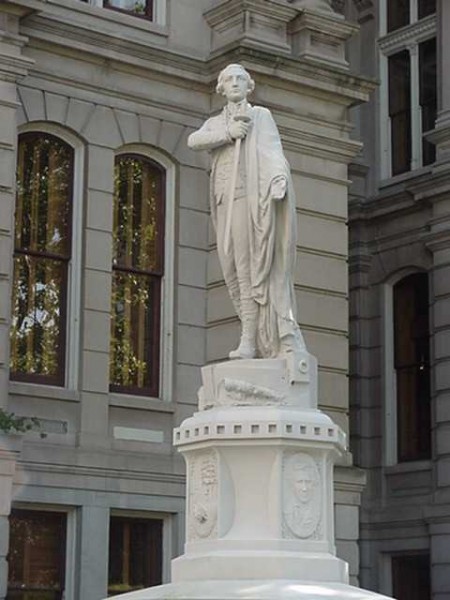‘Indiana At 200’ — Marquis de Lafayette A Big Hit In Jeffersonville
 By ANDREA NEAL
By ANDREA NEAL
A half-century after the Declaration of Independence was issued, the Frenchman who helped the United States win the American Revolution returned to this country on a victory tour. It was a landmark event for cities on his itinerary. Jeffersonville, was one of them.
The 1824-25 visit to the United States by the 67-year-old Marquis de Lafayette, last surviving general of the Revolutionary War, dominated headlines for a year. The closest modern equivalent would be a visit from the Pope.
Congress had voted to invite the aging war hero to the United States to thank him for his service to the Continental Army and to reinvigorate republican spirit as a new generation of political leaders moved into power. President James Monroe sent the official invitation. Cities and states that desired his presence passed special legislation.
 In January 1825, the Indiana General Assembly adopted a resolution urging Lafayette “to visit this state, at the seat of Government, or such town on the Ohio River as the general may designate.”
In January 1825, the Indiana General Assembly adopted a resolution urging Lafayette “to visit this state, at the seat of Government, or such town on the Ohio River as the general may designate.”
Accompanied by his son, George Washington Lafayette, the marquis arrived in the United States in August 1824. He spent the fall and winter touring New England, Philadelphia and Baltimore, with an extended stay at Washington, D.C.
In the spring, he went southward to New Orleans. He then headed north to St. Louis before traveling back east on a route that passed through Nashville, Louisville, Cincinnati, Pittsburgh, Buffalo and many small towns.
Lafayette took a day trip to Indiana while in Louisville, crossing the Ohio River to Jeffersonville on May 11, where he was “greeted on the Indiana shore by a salute of thrice 24 guns, discharged from three pieces of artillery stationed on the river bank,” according to Baird’s History of Clark County, Indiana.
Military officers escorted Lafayette to the home of the late Indiana Territory Governor Thomas Posey, a mansion that overlooked the river. Gov. James B. Ray and veterans of the Revolution were there to meet him. Lafayette attended a public reception followed by a 3 p.m. dinner held outside on a 220-foot-long table decorated with roses and other flowers.
 A banner proclaimed “Indiana welcomes LaFayette, the Champion of Liberty in Both Hemispheres!,” a reference not only to Lafayette’s role helping the colonists but his subsequent, less successful effort to bring equality and freedom to his own country during the French Revolution.
A banner proclaimed “Indiana welcomes LaFayette, the Champion of Liberty in Both Hemispheres!,” a reference not only to Lafayette’s role helping the colonists but his subsequent, less successful effort to bring equality and freedom to his own country during the French Revolution.
After dinner, guests offered toasts to the United States, its friends, the memory of George Washington and “Major General LaFayette united with Washington in our hearts.” Lafayette wished the best to Hoosiers, saying, “May the rapid progress of this young state, a wonder among wonders, more and more evince the blessings of republican freedom.” The dinner concluded around 6 and Lafayette was escorted back to Louisville, as told in Baird’s 1909 history.
Lafayette’s visit inspired the citizens as well as the naming of a city. Kathy Atwell, executive director of the Tippecanoe County Historical Association, said, “Our understanding is that the founder of Lafayette, William Digby, was a great admirer of the Marquis de Lafayette. Digby founded our city in 1825 when the Marquis was doing his hero’s tour.”
Notably, Fayette County was named after Lafayette at its founding in 1818, seven years earlier, an indication of the general’s enduring popularity long after his contribution to American independence.
Directions: The Tippecanoe County Courthouse is at 20 North Third Street, Lafayette.
EDITORS NOTE: This is a series of essays leading up to the celebration of the Indiana Bicentennial In December 2016. The essays focus on the top 100 events, ideas and historical figures of Indiana, in chronological order, tying each to a place or current event in Indiana that continues to tell the story of the state.
Andrea Neal is a teacher at St. Richard’s Episcopal School in Indianapolis and adjunct scholar with the Indiana Policy Review Foundation. She has written extensively about taxes, good governance, higher education, civic education and K-12 reform. Contact her at [email protected].
Indiana Policy Review Foundation is a non-profit education foundation focused on state and municipal issues.
